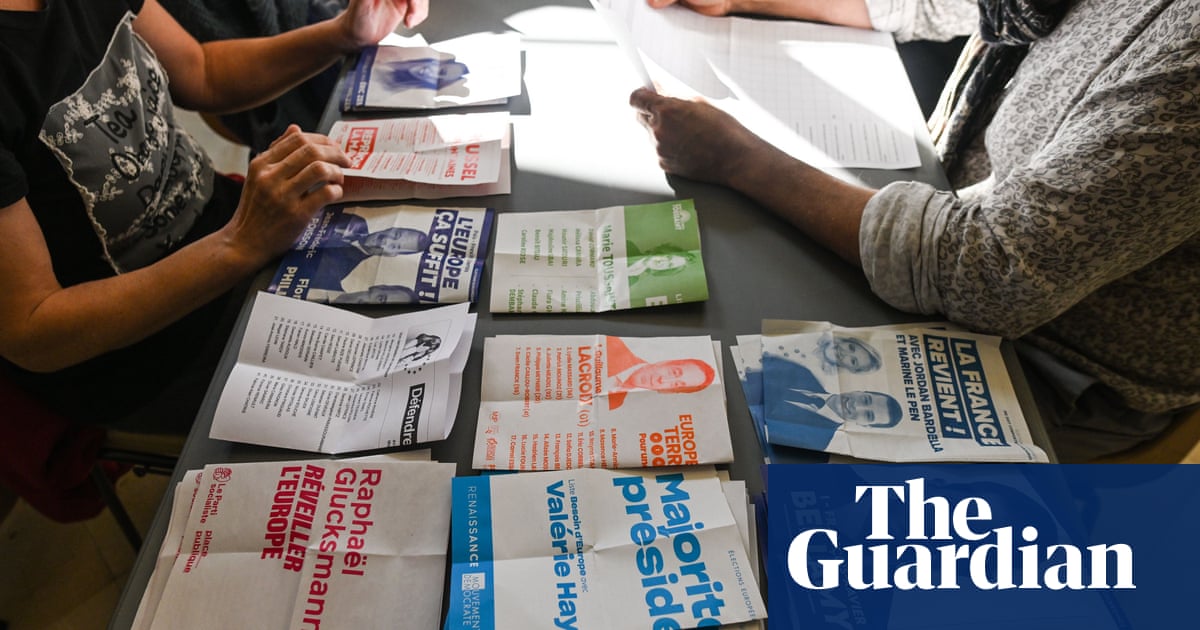Disinformation networks ‘flooded’ X before EU elections, report says

Coordinated networks of accounts spreading disinformation “flooded” social media in France, Germany and Italy before the elections to the European parliament, Dutch researchers have found.
After an in-depth analysis of disinformation on the platform X in four EU countries, the researchers concluded that many of the accounts had been set up after Russia’s invasion of Ukraine but were cranked up in the weeks and days before the vote, with growth in their numbers of followers rocketing.
“The impact of these accounts is increasing at an alarming rate,” said Trollrensics, a specialist consultancy commissioned by the Dutch Socialist and Democratic parties in the European parliament. “We can conclude with absolute certainty that a large coordinated network of accounts was influencing the EU elections in Germany, France and Italy.”
Using specialist software, the consultancy studied 2.3m posts from 468,000 accounts in Germany, France, Italy and the Netherlands. From that dataset, it identified 50,000 as accounts that spread disinformation.
In France, it found that of the more than 127,000 posts in its dataset mentioning Éric Zemmour, the founder of the far-right political party Reconquête, 20% had come from disinformation accounts.
In Germany, 10% of posts about Alternative für Deutschland in their dataset came from the disinformation accounts. The “actual percentage” was likely to be higher in both countries, the consultancy said.
It found no organised disinformation networks in the Netherlands and the accounts it studied in Italy were less concerned with the EU elections and more with controversies over migration or vaccination.
Trollrensics said the scale of disinformation networks meant they could and did “take over an entire debate by just flooding X with posts, reposts, comments and likes”.
Accounts were shown to be “densely connected” and probably run by humans rather than AI, said the Trollrensics co-founder Richard Odekerken.
One X account used in Germany named 888_leila and belonging to a Leila Ruth 888 also posted in Russian.
Analysis showed there were 13 different accounts belonging to a Leila Ruth 888 from user-stated locations around the world including Brazil, Ohio, Finland and Uganda.
Trollrensics specialises in analysing disinformation networks that typically include troll accounts attempting to interfere in a concerted manner to influence public discourse.
after newsletter promotion
The report, titled EU Elections Investigation, said: “The scale of the operation suggests that it [the disinformation network] necessitates significant human resources and time.”
Many were created after 1 January this year and amassed a large number of followers very quickly. Nearly all the accounts followed by the researchers followed back – another red flag for coordinated activity.
“The technique is primarily used to give the account credibility as it appears more legitimate if it has a large number of followers,” the report said.
The Dutch S&D MEP Thijs Reuten who commissioned the report, said it was difficult to establish a causal link between the accounts and the EU elections results, but he had learned through the research that “the first objective was to show doubt” and discredit the authorities in the west, part of a narrative known to be pushed by Russia.
Robert van der Noordaa, another co-founder of Trollrensics, said: “If you are surrounded on whatever social media platform by accounts from the same country, posting in the same language and they are all saying ‘vote for this guy’, that probably works far better than Coca-Cola saying ‘drink Coca-Cola’.”
Related
A New Book Argues That What Happens in Europe Doesn’t…
Remaking the World: European Distinctiveness and the Transformation of Politics, Culture, and the Economy by Jerrold Seigel “No issue in world
Poland plans military training for every adult male amid growing…
Poland’s prime minister, Donald Tusk, has said his government is working on a plan to prepare large-scale military training for every adult male in response t
2025 European Athletics Indoor Championships: Ditaji Kambundji secures women’s 60m…
Switzerland’s Ditaji Kambundji walked away from the 2025 European Athletics Indoor Championships in Apeldoorn on 7 March with much more than her first Europea
Takeaways from the EU’s landmark security summit after Trump said…
BRUSSELS (AP) — European Union leaders are trumpeting their endorsement of a plan to free up hundreds of billions of








